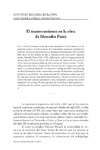Identificador persistente para citar o vincular este elemento:
https://accedacris.ulpgc.es/jspui/handle/10553/35325
| Título: | El trasterramiento en la obra de Mercedes Pinto | Otros títulos: | Trasterramiento in the work of Mercedes Pinto | Autores/as: | Becerra-Bolaños, Antonio Pérez Hernández, Nayra |
Clasificación UNESCO: | 6202 Teoría, análisis y crítica literarias | Palabras clave: | Mercedes Pinto (1883-1976) Canarian Literature Exile Trasterramiento |
Fecha de publicación: | 2017 | Publicación seriada: | Revista de Estudios Hispanicos | Resumen: | For a variety of reasons, many Spaniards emigrated to Latin America in\nthe twentieth century. In cultural terms, this transatlantic movement of\npeople implied the creation of important literary dialogues and\nproductions that enriched both shores. In this context, we offer a\nreflection on the work of the Canarian author, Mercedes Pinto\n(1883-1976), following her exile in Uruguay during the dictatorship of\nPrimo de Rivera. We will analyze the impact his exile exercised on her\nliterary production following Gaos's concept of ``trasterramiento.{''}\nFurther, taking Gonzalez Diaz's concept of the Canary Islander's\n``migraciones golondrinas{''} as a point of departure, we map out a\nreading of Pinto's work focusing on three key moments of her\ntransatlantic crossing: the departure (expectations, perspectives,\npossibilities); the voyage itself and her subsequent wanderings; and the\nexperience of exile (how life becomes literature). Her years of exile in\nseveral Latin American countries constituted a long and dynamic journey\nthat proved fruitful for her writing. We thus approach her work from a\ndual perspective-analyzing both the aesthetic experience itself along\nwith the places that populate it. | URI: | https://accedacris.ulpgc.es/handle/10553/35325 | ISSN: | 0034-818X | DOI: | 10.1353/rvs.2017.0061 | Fuente: | Revista de Estudios Hispánicos [ISSN 0034-818X], v. 51 (3), p. 659-675 |
| Colección: | Artículos |
Visitas 5
128
actualizado el 10-ene-2026
Descargas
246
actualizado el 10-ene-2026
Google ScholarTM
Verifica
Altmetric
Comparte
Exporta metadatos
Los elementos en ULPGC accedaCRIS están protegidos por derechos de autor con todos los derechos reservados, a menos que se indique lo contrario.
